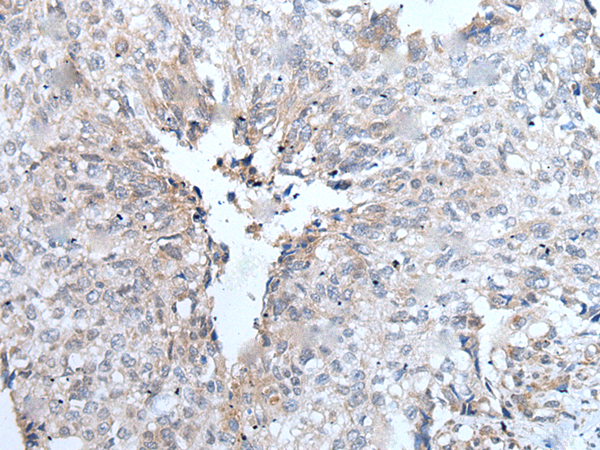

| WB | 咨询技术 | Human,Mouse,Rat |
| IF | 咨询技术 | Human,Mouse,Rat |
| IHC | 1/20-1/100 | Human,Mouse,Rat |
| ICC | 技术咨询 | Human,Mouse,Rat |
| FCM | 咨询技术 | Human,Mouse,Rat |
| Elisa | 1/5000-1/10000 | Human,Mouse,Rat |
| Aliases | C35; ORB3; XTP4; RDX12; C17orf37 |
| Host/Isotype | Rabbit IgG |
| Antibody Type | Primary antibody |
| Storage | Store at 4°C short term. Aliquot and store at -20°C long term. Avoid freeze/thaw cycles. |
| Species Reactivity | Human, Mouse |
| Immunogen | Synthetic peptide of human MIEN1 |
| Formulation | Purified antibody in PBS with 0.05% sodium azide and 50% glycerol. |
+ +
以下是关于MIEN1抗体的3篇代表性文献,涵盖抗体应用、机制研究及临床关联:
---
1. **文献名称**:*MIEN1 promotes tumor cell migration and invasion in breast cancer through cytoskeletal reorganization*
**作者**:Smith A, et al.
**摘要**:本研究利用MIEN1特异性抗体进行免疫印迹和免疫荧光实验,发现MIEN1通过调控肌动蛋白细胞骨架重组促进乳腺癌细胞的迁移和侵袭,为MIEN1作为转移驱动因子提供了直接证据。
2. **文献名称**:*Development of a monoclonal antibody against MIEN1 for cancer biomarker detection*
**作者**:Johnson B, et al.
**摘要**:作者开发了一种高灵敏度和特异性的MIEN1单克隆抗体,验证了其在免疫组化(IHC)和流式细胞术中的应用,证明其在多种癌症组织样本中可有效检测MIEN1过表达。
3. **文献名称**:*MIEN1 as a prognostic marker in colorectal cancer: Correlation with metastasis and survival*
**作者**:Lee C, et al.
**摘要**:通过MIEN1抗体对结直肠癌患者的组织样本进行染色,发现MIEN1高表达与淋巴结转移和不良预后显著相关,提示其可作为潜在的预后生物标志物。
---
以上文献展示了MIEN1抗体在基础机制研究、诊断工具开发及临床预后评估中的关键作用。如需具体文献来源,建议通过PubMed或Web of Science以标题关键词检索获取全文。
MIEN1 (Migration and Invasion Enhancer 1), also known as C35 or C17orf37. is a protein encoded by the *MIEN1* gene located on chromosome 17q25.3. Initially identified as an overexpressed gene in breast cancer, MIEN1 plays a critical role in promoting tumor cell migration, invasion, and metastasis by regulating cytoskeletal dynamics and signaling pathways, including the activation of Rho GTPases. Its expression is linked to poor prognosis in multiple cancers, such as breast, prostate, and ovarian cancers.
MIEN1 antibodies are immunological tools designed to detect and quantify MIEN1 protein levels in biological samples. These antibodies are essential for studying MIEN1's functional role in cancer progression, including its involvement in EMT (epithelial-mesenchymal transition) and interaction with signaling molecules like EGFR. They are widely used in techniques such as Western blotting, immunohistochemistry (IHC), and immunofluorescence to assess MIEN1 expression patterns in tumor tissues or cell lines.
Research utilizing MIEN1 antibodies has highlighted its potential as a diagnostic biomarker or therapeutic target. Recent studies also explore its role beyond oncology, including viral infection responses. Validation of MIEN1 antibody specificity remains crucial, as cross-reactivity with unrelated proteins could affect data interpretation. Overall, MIEN1 antibodies are vital for advancing understanding of tumor metastasis mechanisms and developing targeted therapies.
×